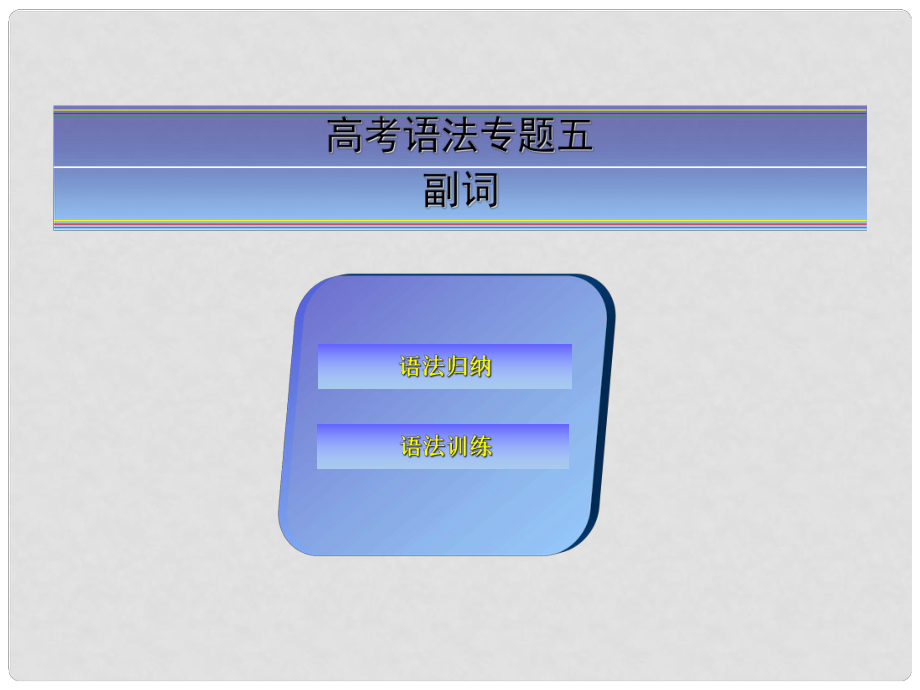《高考英語(yǔ)一輪復(fù)習(xí) 語(yǔ)法專題訓(xùn)練 副詞課件 新人教版》由會(huì)員分享��,可在線閱讀�����,更多相關(guān)《高考英語(yǔ)一輪復(fù)習(xí) 語(yǔ)法專題訓(xùn)練 副詞課件 新人教版(15頁(yè)珍藏版)》請(qǐng)?jiān)谘b配圖網(wǎng)上搜索���。
1�����、對(duì)應(yīng)學(xué)生用書(shū)對(duì)應(yīng)學(xué)生用書(shū)P P186 186 語(yǔ)法歸納歸納語(yǔ)法歸納語(yǔ)法 分類詳解分類詳解副詞定義:副詞是指可以用來(lái)修飾動(dòng)詞�,形容詞���,副詞或全句的詞���。一、副詞的作用1修飾形容詞作狀語(yǔ)He is terribly sorry for what he has done.The professor spoke highly of the young man.名師提示:以a開(kāi)頭的表語(yǔ)形容詞(alike例外)�,通常不用very修飾。如:very much afraid;wide awake�;fast asleep等2修飾動(dòng)詞作狀語(yǔ)All the students did the job perfectly
2��、.名師提示:very不可以修飾動(dòng)詞作狀語(yǔ)�。I very like English.()I like English very much/a lot.()3修飾副詞作狀語(yǔ)You drive too fast.The boy plays the piano quite well.4修飾句子作狀語(yǔ);有些副詞置于句首作狀語(yǔ)Fortunately�����,Mike quickly found another job.Happily����,this never happened.5作表語(yǔ)My mother isnt in;but my father is upstairs.6個(gè)別副詞作后置定語(yǔ)The men here
3����、are all experts.Have you seen the newspaper today?7作補(bǔ)語(yǔ)Open the door and let the dog out.He was seen there just now.二、副詞的分類副詞修飾動(dòng)詞��、形容詞�、其他副詞、全句或名詞詞組及介詞��。副詞一般可分為以下幾類:1時(shí)間副詞���,例如:now�����,usually�,often,always2地點(diǎn)副詞��,例如:here�,there,out����,everywhere3方式副詞,例如:hard���,well����,fast�����,slowly4程度副詞��,例如:very,much�����,still����,almost5疑問(wèn)副詞��,例如:ho
4���、w���,when,why�,where6關(guān)系副詞,例如:when�,where,why7連接副詞�,例如:whether,why����,when�,how名師提示:(1)以ly結(jié)尾的詞不一定都是副詞����,也有形容詞。如:friendly�����;likely���;lonely����;silly��;manly等(2)有些副詞有兩種形式��。一種與其形容詞形式一樣����,另一種是在后加ly。二者意義有一定差異或迥然不同�����。常考的有:close(指實(shí)際距離)closely仔細(xì)地���,密切地(抽象概念)wide(指實(shí)際寬度)widely廣泛地(抽象概念)high(指實(shí)際高度)highly高度地(抽象概念)deep(指實(shí)際深度)deeply深深地(抽象概念)f
5�����、ree(免費(fèi)地)freely自由地hard(努力地)hardly幾乎不most(最)mostly大多數(shù)情況三����、副詞的位置1時(shí)間副詞和地點(diǎn)副詞的位置一般放在句尾�����。如果這兩種副詞同時(shí)出現(xiàn)在句中����,則把地點(diǎn)副詞放在時(shí)間副詞前面���,也可把時(shí)間副詞放在句首����。例如:Yesterday they went boating in Zhongshan Park.They went boating in Zhongshan Park yesterday.但表示不確定時(shí)間的副詞通常放在行為動(dòng)詞之前��,情態(tài)動(dòng)詞、助動(dòng)詞和to be之后�。這些副詞有always,seldom��,often�,never,rarely等�。例如:He
6、 often comes late.We are never late.We should always work hard.2程度副詞一般放在被修飾詞之前(enough例外)��。例如:You are old enough to do this.He is very careful.3方式副詞修飾不及物動(dòng)詞時(shí)放在被修飾詞之后�,修飾及物動(dòng)詞時(shí)放在被修飾的動(dòng)詞之前或賓語(yǔ)之后,如賓語(yǔ)較長(zhǎng)��,也可把副詞放在動(dòng)詞與賓語(yǔ)之間�����。例如:He works hard.He speaks English very well.Mr.Wang wrote carefully some letters to his frie
7����、nds.4副詞修飾名詞時(shí),一般放在該名詞之后��;修飾介詞時(shí)(如well��,right,just����,soon等),放在該介詞前�����;副詞修飾全句時(shí)���,一般放在句首���。例如:The person there is looking for you.Theres the house�,right in front of you.Truly he will go to Shanghai.四、副詞的特殊用法1倒裝含有否定意義的副詞rarely����,seldom,never���,little��,hardly等位于句首時(shí)���。如:Never shall I do it again.here����,there��,now��,then����,out,in��,up
8�、,down�����,away表位置移動(dòng)的詞主語(yǔ)��。如:Here comes the bus.(若主語(yǔ)是代詞�����,不用倒裝:Here he comes.)Out rushed the boy.(Out he rushed.)2有些副詞也可用作連詞,如:though�,immediately,instantly���,in case等���。Though he is a child,he knows a lot.(though用作連詞)考例:Have you been to New Zealand?No�,Id like to,_.Atoo BthoughCyetDeither解析:though用作副詞�,常在句末,仍表轉(zhuǎn)折關(guān)系
9��、�。答案:BI dont know if it will rain,but I will take my raincoat�����,just in case.I will take my raincoat in case it rains.immediately/instantly用作副詞���,意思是“立即”;用作連詞,意思是“一就”��。3形容詞��、副詞的一些固定搭配�����。如:smoke heavily�����;depend heavily on��;rain/snow heavily�;wide awake(非常清醒的);fast/sound asleep(熟睡的)����;heavy traffic;strong wind�����;high/low price�����;large/small number/population等。這就要求同學(xué)們?cè)谄饺諏W(xué)習(xí)時(shí)���,要留心多積累���、歸納并記憶。對(duì)應(yīng)專題對(duì)應(yīng)專題 分類訓(xùn)練分類訓(xùn)練 溫溫示示提提馨馨
 高考英語(yǔ)一輪復(fù)習(xí) 語(yǔ)法專題訓(xùn)練 副詞課件 新人教版
高考英語(yǔ)一輪復(fù)習(xí) 語(yǔ)法專題訓(xùn)練 副詞課件 新人教版

